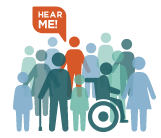The Nisonger RRTC project, Can You Hear Me Now? Listening to People with Intellectual and Developmental Disabilities in Health Research, has three parts. People with intellectual and developmental disabilities (IDD), health professionals, researchers, and educators work on the following studies as a team.
What are we doing?
The team selected health surveys and changed the wording to make them easier to understand. We are creating new versions of the surveys.
We are testing new surveys with people with IDD all over the country. We are asking how many of them have mental health issues. They are telling us if they think the surveys make it easier for them to let others know about their health needs.
We are making new guidelines for health professionals that use the things we have learned from our studies. These guidelines will help them to treat their patients and help patients speak up about their health.
Why are we doing it?
We want people with IDD to be able to give answers about their own health instead of someone else doing it.
This study will let us know if the new health surveys are useful. It will also record about how many people in the country have both IDD and mental health issues. This number can be used in reports that show the importance of quality health care for people with IDD.
We want to help professionals give better care to their patients. We want to give people with IDD a voice in their health care.
How are we doing it?
The Disability Experiences Expert Panel (DEEP) looked at health surveys and let us know what words to change, so the questions are easy to understand. We added pictures to help make the questions more clear. We are testing the new surveys with adults with IDD and a study partner. We are asking them if they are easy to use.
The team will be speaking to people in six states about their health using the new surveys. We will share what we find with others.
We are looking at what people know about mental health and health care for people with IDD. Where there are gaps in what people know, we will look for ways to fill them in. Our team of disability and research experts are helping us do this in a way that will be clear to people with IDD. People with IDD are being asked to give their ideas of which factors of mental health care are important to them.
Table of Studies
| Study Phase | Purpose | Process | Timeline |
|---|---|---|---|
| Study 1 Measures | Give people with IDD a way to share their health needs with professionals | Work with our researchers with IDD to fix health surveys to make them easier to understand
Test new health surveys with 50 adults with IDD to see if changing the surveys helped people with IDD report their health needs |
2018-2020 |
| Study 2 Prevalence | Find out how many adults with IDD also have mental health concerns | Give health surveys to adults with IDD across 5 states
Continue testing surveys from Study 1 with adults with IDD from 5 states to see if they are working Some people will also interview with a doctor. This will help us check if our surveys are giving us the right information about the health needs of people with IDD |
2021-2023 |
| Study 3 Guidelines | Create treatment guidelines for mental health professionals | Look at current research on mental health treatment for people with IDD
Talk with people with IDD and mental health professionals to find out which factors of therapy are helpful Use info to make guidelines for professionals to use when treating people with IDD |
2018-2023 |
Scientific Language Table
| Study Phase | Purpose | Process | Timeline |
|---|---|---|---|
| Study 1 Measures | Increase self-reports in adults with intellectual and developmental disabilities (IDD) |
|
2018-2020 |
| Study 2 Prevalence | Determine the prevalence and health outcomes of mental and/or behavioral health concerns among adults with IDD. |
|
2021-2023 |
| Study 3 Guidelines | Create best practice guidelines for psychotherapy to advance mental and behavioral health treatment for adults with IDD |
|
2018-2023 |

